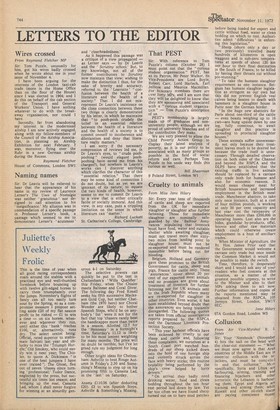Naming names
Sir: Dr Leavis will be relieved to hear that the appearance of his name in my review of Laurence Lerner's The Uses of Nostalgia was neither ' gratuitous' nor designed to call attention to his 'insignificance.' My allusion was in commendation of a specific passage in Professor Lerner's book, a passage which seemed to me to demonstrate Lerner's 'acuteness ' and 'clearheadedness.'
As it happened this passage was a critique of a view propagated — as Lerner says — by Dr Leavis and the Scrutiny school.' But, to my knowledge, not all of the former contributors to Scrutiny now maintain that view; wishing to make the distinction I thus, for the sake of brevity and accuracy, referred to the ' Leavisite ' "confusion between the health of a literature and the health of a society." That I did not misrepresent Dr Leavis's insistence on the close connection between these two things is clearly demonstrated by his letter, in which he maintains that "to pooh-pooh crudely the belief in an essential relation between the health of a literature and the health of a society is to commit oneself to incoherence and dilettantism and deny that literature really matters."
I am sorry if the necessary compression of reviews led me, in Dr Leavis's eyes, to "crude poohpoohing" (would elegant poohpoohing have saved me from his charges?), but nowhere in Leavis's works can I discover anything which clarifies the character of this " essential relation." That there may be some kind of connection I do not doubt, but as yet we are ignorant of its nature; to equate the two kinds of health, however, seems to me to commit Dr Leavis to a view that is either critically facile or socially immoral. And this view, in any case, puts a crippling limitation on the sense in which literature can 'matter.'
Richard Luchett St. Catharine's College, Cambridge


















































 Previous page
Previous page